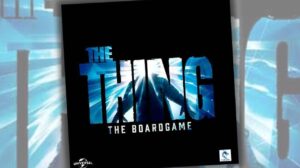Disclosure: Meeple Mountain received a free copy of this product in exchange for an honest, unbiased review. This review is not intended to be an endorsement.
Everyone knows that Cthulhu and his elder god buddies aren’t exactly the nicest beings around, but do you know what else is evil? Tech giants. The pairing of elder gods and technological conglomerates sounds like a Las Vegas shotgun wedding with a happy ending. You and your friends are all bloggers trying to get into an exclusive press event that you aren’t invited to. Why go through the trouble? Rumor has it that it’s for the launch of a new phone release that just happens to open a dimensional portal. That will end everything you know and love, which is problematic for your career. This sounds like a team effort, but it isn’t. There is only one winner in this game because saving the world brings clout, and your nascent blog dearly needs to grow.
Just like my introduction, this game does not take itself seriously. The designer behind this game, Dan Ackerman, is a former game journalist and currently working as a senior editor at CNET. His experience in writing and the technology industry bleeds into this game. There is more than a handful of flavor text as it plasters itself on each card as well as the rulebook itself. I am a fan of more personality in rulebooks, yet I felt the rulebook here sacrificed concise reading for a “humorous” tone. Despite my small complaint, the writing behind this game is superb and it is a highlight.

Where The World Ends
The end goal here is to reach the Elevator, and that requires a series of steps that involve completing different objectives. It’s surprisingly involved:
- Investigate all four side rooms
- Collect 4 QR codes
- Gather 3 Decryption codes by defeating enemies
- Submit your QR codes to the security desk
- Head to the Elevator
In brief, this game is a race to the Elevator, and it is up to you to decide to approach these objectives. Your player “mat” is a cell phone that will keep track of all this information, and you also have Gear cards to help you along the way. Because this is a Cthulhu themed game, there is a Doomsday clock that will end the entire game after 20 turns.
Turns are straightforward. You have two actions, and like any other dungeon crawler, you move around, start fights, investigate rooms, and pick up gear. The four purple tiles have an effect when you interact with them, such as the Press Room allowing you to draw one Gear card or submitting your QR codes at the Security Room to get access to the Elevator.
That is the general outline of the game itself. I’m going against the traditional review format and state my impressions right now. I feel this game has a great soaring concept held back by a series of missed opportunities.
The proposal to create a rules-light game emulating a narrative dungeon crawl style of gameplay is an appealing one. Throw in a well-written satire of Silicon Valley, and it sounds like a cocktail of success. There’s just this tiny problem about noticeable gaps in the game’s mechanisms.
One of the most obvious ones is the four random side rooms that you must investigate. I’m sure when I mentioned that, you probably thought each room had some mechanism or gimmick to contend. Unfortunately, that isn’t the case here. The only difference between the rooms is the color of the room, signifying the level of punishment for failing to investigate. I was puzzled by this decision because this would’ve been a good opportunity for world-building by having the players interact with the mechanisms to give the impression of an implied narrative. Sometimes flavor text (like Love) just ain’t enough.

Missing The Details
The reason why this is an issue is that the game puts you in a situation where you have a turn limit and only a certain number of actions to use per turn. Based on this, you would assume the game would put you in dilemma situations where you need to prioritize and make decisions with your actions to carve your way through the tech headquarters. Since all rooms are the same, the only actual decision you make is going left or right. There is nothing to explore either: the path is already laid out for you, making the game feel automated instead of engaging.
Speaking of investigations, when you investigate a room, you draw from a deck of cards that will determine your failure and success along with the consequences of doing so. These consequences will often generate monsters and QR codes to be placed on the map randomly. This micro-ecosystem means that each game is different, and everyone must investigate every single room, ensuring there are enough monsters and QR codes for any number of players. My main issue is the success of the investigation relies on a card draw. And that often proves a terrible mechanism.
I’m going to wear my pseudo game designer hat here and want to demonstrate a simple way to maintain the rules-light nature with the randomization the game desires. Instead of simply drawing a card, you roll a die and have to beat a target number. This target number is based on the room itself, meaning some rooms are easier to investigate. The added twist here is each time you fail an investigation, you will generate a “Tenacity” resource. This resource can be spent on future rolls to add +1, and you can spend as much as you like.
The result of my band-aid mechanism leads you to ask several questions before the game even starts. Do you go for the low difficulty rooms to investigate even though they might be farther away? Or go for the high numbers to push your luck or generate Tenacity? Is investigation failure a concern for you? Throw in my previous suggestions to have each room come with a unique gimmick, and these questions become harder to answer. You don’t need complicated rules to make an interesting environment for the players to engage in.
There are also the Encounter cards that you draw each time you fail an investigation. As you would expect, this deck wants to screw you over, and that’s fine. The problem with the deck is it doesn’t do as much as I hoped. Out of the 20 cards, 9 of them simply move you to another room. Since this is a small deck of cards, every inch of cardboard should leave an impact, and I was surprised the game didn’t go much further with the ramifications considering the satire imagery the game is trying to portray. I was expecting a bit more chaos and, just because it’s funny, to potentially hurt other players due to your investigation screw up.

Uninvolved Combat
The last bit is the combat itself. Whenever you start a fight with an enemy, you reveal a tarot-sized card from the Enemy deck. The enemy card presents you with well-written flavor text followed by its Strength number and a Skill. This Skill is something you pick at the beginning of the game like Hacking or Memes, and if your skill matches the enemy, you get a +1 bonus to your die roll. Yes, you simply roll the die and try to match or beat the strength number with Gear cards allowing you to fudge the results. I don’t mind this simplistic method because this is supposed to be a game with snappy pacing, so having complicated combat wouldn’t help.
However, the combat could have been a great vehicle to put you in an awkward situation while giving you a funny story. Instead of a simple +1 modification, why not have a condition in the fight based on what you draw? Conditions such as no gear cards allowed, discarding a random gear card, or doing two dice rolls and forced to pick the worse result? Again, I felt there was a missed opportunity here to enforce the game’s theme.
That is all I can say about Techlandia. I love the idea of a dungeon crawl with fewer rules, making it feel like a filler. It’s certainly a gap that I don’t see any other game trying to cover. This theme about Cthulhu mixing with Silicon Valley sounded strange to me at first, but brilliant writing made me a fan of this concept. I just wished the game designer spent as much effort on actual game design as he did on flavor text. At its current state, Techlandia feels undercooked, much like a pancake flipped too early.











Add Comment